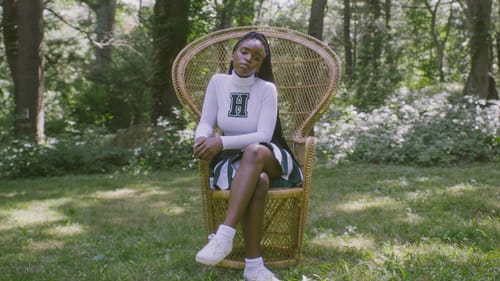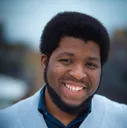Stay in the Loop
BSR publishes on a weekly schedule, with an email newsletter every Wednesday and Thursday morning. There’s no paywall, and subscribing is always free.
How we align with our BlackStar
Why are we selling the BlackStar Film Festival short?

Not everyone understands me when I say I have to work twice as hard for half of what my peers have. Yeah, it has a lot to do with the melanin, my cultural background, and my upbringing. I’m a workhorse because, at any given moment, things can fall apart. For better, I’m a workhorse because I want to be ready when an opportunity presents itself—even knowing that opportunity comes statistically less often for people like me. For worse, I’m a workhorse because I grew up knowing that more people than not—even some of the people who look like me—were doubtful that I would make it.
Destiny follows
Destiny says I’m going to fail, and it’s not the kind of "failing up" that everyone is pitching around: positivity, optimism, leveling up, and whatever else you can find on those social-media quotables. Destiny, who would probably not follow me on social media, is telling me that I’m going to fail down, all the way down. And I think destiny is telling me and many other people like me that message. Sometimes that message comes passive-aggressively, or worse, ignorance spawns it.
I think that’s what happened with some press around BlackStar in its eighth year, arguably its most successful one yet. I’m not even talking success by the numbers, but the films that were screened and the conversations around them. Selah and the Spades, a Sundance film which took the festival’s Best Narrative Feature prize, was acquired by Amazon just weeks before BlackStar. Big names like QuestLove, Solange Knowles, Tarana Burke, and Spike Lee contributed films or time at panels. The Infiltrators (named the festival’s best documentary feature) is in talks for a series adaptation.
Add that to all the short films and other programs for all ages, and BlackStar Film Festival is a foundational element for people of color looking to carve their own sense of destiny.
A new home?
So why were we talking so much about how BlackStar might be going away?
A July 31 preview of the festival from WHYY was headlined “Philly’s BlackStar Film Festival is looking for a new home.”
“The annual BlackStar Film Festival returns this weekend, with four days of new cinema from African-American filmmakers and other communities of color in West Philadelphia,” the article begins. The next lines note that it’s the festival’s last year at International House: “BlackStar is losing its longtime home venue, which may cause it to move to another city.”
This was in reference to International House (host of LightBox Film Center) closing in December of this year, meaning BlackStar’s “hub” will be forced to move.

Losing our way
There are a couple things wrong here. First, BlackStar is not an “African-American” film festival with “other communities of color.” It’s much more inclusive and widespread than that. The other problem with this particular article is that the focus isn’t on the film festival itself, but on the fact that International House is shutting its doors.
This might not seem like a big deal. But, check it…
This is the kind of doom and gloom that I’ve heard destiny tell me. That low-key, inadvertent talk about how I’m losing my way. Instead of giving a focused and well-deserved positive spotlight to the festival’s offerings, the WHYY piece highlights the suggestion of BlackStar’s leaving Philadelphia in the future—i.e., going out to the suburbs or another city, where BIPOC might not have easy access to it. I can’t just hop on the El and make my way to Oaks or Chester. Renting a car ain’t cheap. And getting a group of friends to carpool over isn’t always an option, especially when you’re older and you’ve got busy friends who are, you know, working twice as hard to get half as much.
It will be alright
I’m not one to shy away from reality, and I am a realist. When I’ve got to make a move to keep from being caught up in dire straits, I consider my options. I reach out to folks who can help. I let people close to me know my situation. And then, in those lonelier, quiet moments that get filled with self-doubt, I put Kendrick Lamar on repeat:
We gon be alright!
I’d like to give this WHYY coverage the benefit of the doubt: perhaps the situation BlackStar faces was indeed newsworthy alongside the festival’s 2019 roster. It doesn’t have a home lined up for next year. But that in itself is a story on its own, and it will be alright. With festival founder Maori Karmael Holmes out doing her own thing beyond Philly (which, come on, respect her hustle), it may appear that she’s distracted or has removed her passion. She hasn’t, and if she has, that’s for her to conclude, not for us. What she’s doing? Working twice as hard for half as much.
What are we going to do?
On the grander scale, this is a Philly problem. We’ve got some self-awareness issues to work out. We love you when you’re home, but home is a complicated thing when the people who live with you cast you away.
Again: I’m not one to shy away from reality—but I am an idealist, too. I’d like to believe that the City of Brotherly Love takes responsibility for its people. I’d like to believe that my fellow Philly denizens can see the whole picture—that this is not only an “African-American” film festival, but a festival that encompasses many identities, creeds, and diasporas. An event that took root in a sanctuary city, a city that prides itself on its diversity. The bigger story is that an extension of that sanctuary, International House, is shutting its doors, and that many festivals, events, employees, and more will have to find their piece of that sanctuary elsewhere.
The key word in the chorus in that Kendrick Lamar song isn’t alright, it’s we. What are we going to do about supporting art in the city? What are we going to do when it isn’t alright for other people? Are we going to talk about their situation, like it’s gossip for sensationalistic headlines, or are we going to appreciate what they’ve achieved, and mobilize in the same way that Holmes did, to build a blossoming platform for the voices of many who have so few opportunities like this?
Sign up for our newsletter
All of the week's new articles, all in one place. Sign up for the free weekly BSR newsletters, and don't miss a conversation.
 Kyle V. Hiller
Kyle V. Hiller